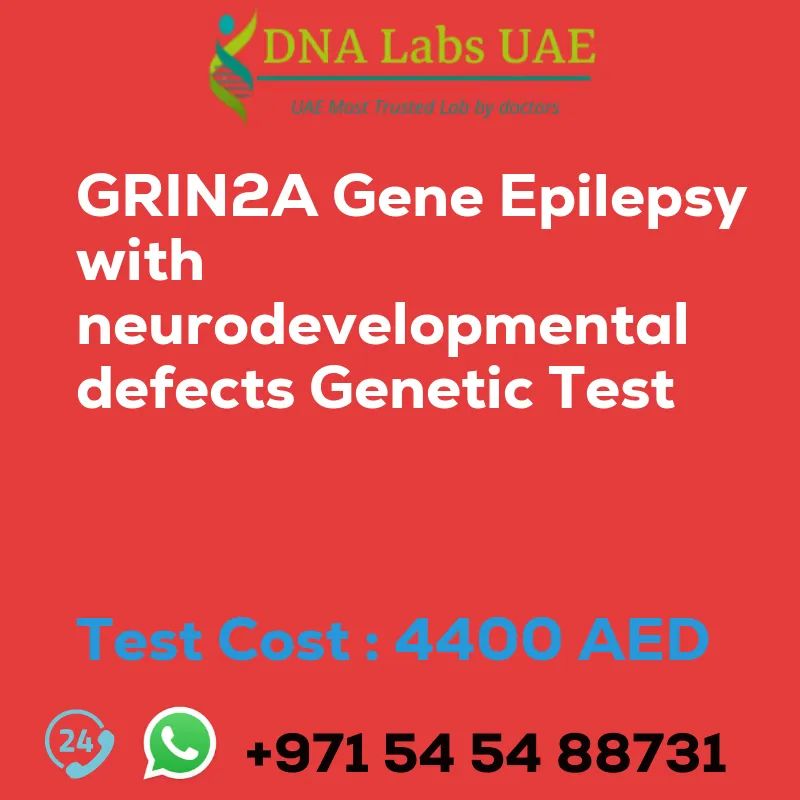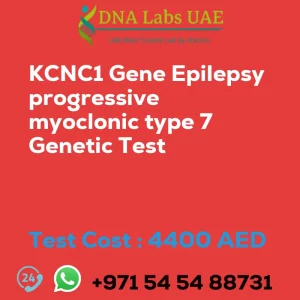GRIN2A Gene Epilepsy with neurodevelopmental defects Genetic Test
Test Name: GRIN2A Gene Epilepsy with neurodevelopmental defects Genetic Test
Components: NGS (Next-Generation Sequencing) Technology
Price: 4400.0 AED
Sample Condition: Blood or Extracted DNA or One drop Blood on FTA Card
Report Delivery: 3 to 4 Weeks
Method: NGS Technology
Test Type: Neurological Disorders
Doctor: Neurologist
Test Department: Genetics
Pre Test Information: Clinical History of Patient who is going for GRIN2A Gene Epilepsy with neurodevelopmental defects NGS Genetic DNA Test. A Genetic Counselling session to draw a pedigree chart of family members affected with GRIN2A Gene Epilepsy with neurodevelopmental defects.
Test Details
The GRIN2A gene is associated with a form of epilepsy known as epilepsy with neurodevelopmental defects. This condition is characterized by seizures that typically begin in early childhood and are often accompanied by developmental delays, intellectual disability, and other neurological symptoms.
NGS (next-generation sequencing) genetic testing is a method of analyzing DNA that can detect mutations or variations in multiple genes simultaneously. This type of testing can be useful in diagnosing genetic conditions, including epilepsy with neurodevelopmental defects caused by mutations in the GRIN2A gene.
NGS genetic testing involves sequencing the entire coding region of the GRIN2A gene, as well as other genes associated with epilepsy and neurodevelopmental disorders. The results of this testing can help healthcare providers determine the cause of a patient’s symptoms and develop a personalized treatment plan.
It is important to note that genetic testing may not be necessary for all individuals with epilepsy and neurodevelopmental defects, and that a thorough clinical evaluation and other diagnostic tests may also be necessary. Additionally, genetic testing can have limitations, including the possibility of false positives or false negatives. It is important to discuss the potential risks and benefits of genetic testing with a healthcare provider before undergoing testing.
| Test Name | GRIN2A Gene Epilepsy with neurodevelopmental defects Genetic Test |
|---|---|
| Components | |
| Price | 4400.0 AED |
| Sample Condition | Blood or Extracted DNA or One drop Blood on FTA Card o |
| Report Delivery | 3 to 4 Weeks |
| Method | NGS Technology |
| Test type | Neurological Disorders |
| Doctor | Neurologist |
| Test Department: | Genetics |
| Pre Test Information | Clinical History of Patient who is going for GRIN2A Gene Epilepsy with neurodevelopmental defects NGS Genetic DNA Test A Genetic Counselling session to draw a pedigree chart of family members affected with GRIN2A Gene Epilepsy with neurodevelopmental defects |
| Test Details |
The GRIN2A gene is associated with a form of epilepsy known as epilepsy with neurodevelopmental defects. This condition is characterized by seizures that typically begin in early childhood and are often accompanied by developmental delays, intellectual disability, and other neurological symptoms. NGS (next-generation sequencing) genetic testing is a method of analyzing DNA that can detect mutations or variations in multiple genes simultaneously. This type of testing can be useful in diagnosing genetic conditions, including epilepsy with neurodevelopmental defects caused by mutations in the GRIN2A gene. NGS genetic testing involves sequencing the entire coding region of the GRIN2A gene, as well as other genes associated with epilepsy and neurodevelopmental disorders. The results of this testing can help healthcare providers determine the cause of a patient’s symptoms and develop a personalized treatment plan. It is important to note that genetic testing may not be necessary for all individuals with epilepsy and neurodevelopmental defects, and that a thorough clinical evaluation and other diagnostic tests may also be necessary. Additionally, genetic testing can have limitations, including the possibility of false positives or false negatives. It is important to discuss the potential risks and benefits of genetic testing with a healthcare provider before undergoing testing. |








